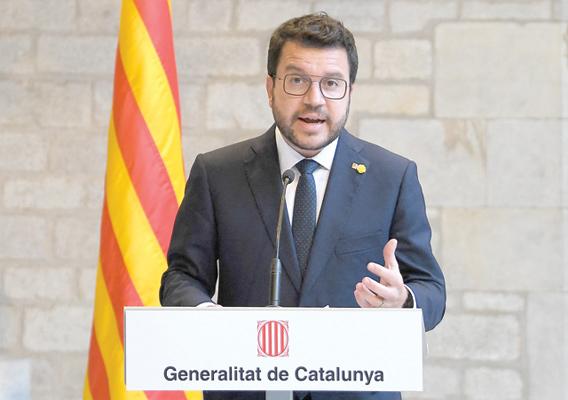You are here
Spain PM admits huge differences remain as Catalan talks reopen
By AFP - Sep 16,2021 - Last updated at Sep 16,2021

The Catalan regional president, Pere Aragones, holds a press conference following his meeting with the Spanish prime minister, at the Generalitat Palace (Catalan regional government headquarters) in Barcelona, on Wednesday (AFP photo)
BARCELONA — Spanish Prime Minister Pedro Sanchez on Wednesday resumed dialogue with Catalonia's separatist leadership in a bid to resolve a political crisis triggered by the region's failed independence bid in 2017.
After an 18-month hiatus, Sanchez travelled to Barcelona where he met recently elected Catalan leader Pere Aragones for two hours, saying afterwards that the two sides were still "very far apart".
In October 2017, the Catalan regional government staged a referendum banned by Madrid and then issued a short-lived declaration of independence, triggering Spain's worst political crisis in decades.
Since then, Catalonia has remained a major issue in Spanish politics and one that Sanchez's government has vowed to tackle through negotiations.
"The ideas we have on how to resolve the crisis in Catalonia are very different, radically different from those of the Catalan government," Sanchez told reporters after the meeting.
The separatists came to the talks bent on securing an amnesty for everyone involved in the failed independence bid, as well as a new referendum on self-determination.
But Spain is implacably opposed to both ideas.
"For us, neither a referendum nor amnesty is possible," Sanchez said, while insisting on the Spanish government's desire "to resolve this crisis".
"The most important thing is to move forward without setting dates for the resolution of this conflict," he said, pledging to work "without haste, without breaks and without setting deadlines".
"We are going to need time, a lot of time."
'Demand results'
Speaking shortly afterwards at a separate press conference, Aragones agreed that dialogue "needs time", but he warned the talks must bear fruit.
"As the negotiations progress, we will demand results," the Catalan leader said.
"I believe that the referendum is the most inclusive option because it allows everyone to defend their proposal."
While Sanchez rejects an independence referendum, he has said he is open to a possible vote on Catalonia's place within Spain, but within limits.
The Spanish leader had promised to resume talks in January 2020 after ERC — Catalonia's oldest and largest separatist party — offered crucial parliamentary support to his minority government.
Initial talks began a month later, but were soon suspended as the coronavirus pandemic took hold.
Many things have changed since the October 2017 referendum and the ensuing crisis.
Those responsible were tried and jailed while others fled abroad to avoid prosecution, leaving the separatist movement decapitated and deeply at odds over how to move forward.
The issue of dialogue with Madrid has been a huge point of friction in the region of 7.8 million people, who remain divided over the question of independence.
'People get tired'
Despite the differences, negotiations are thought to have a better chance this time thanks to a shake-up within Catalonia's separatist-dominated leadership, with moderate leftist ERC taking the reins several months ago.
Last time, its hardline counterpart JxC was in charge.
The shift had an immediate effect: Within weeks, the Spanish government had pardoned the jailed separatist leaders and agreed to resume top-level talks on the Catalan crisis.
ERC favours a negotiated strategy to achieve independence via dialogue with Madrid, while JxC, now the junior coalition partner, which wants to maintain a confrontational approach.
The split within the separatist ranks has also affected morale among their supporters, Ernesto Pascual, a political scientist at Catalonia's Open University said.
"People are beginning to turn their attention to more tangible issues than Catalan independence, which is why we're seeking this lack of motivation," said Pascual.
"People get tired of just focusing on the national issue... especially during this health crisis and the economic crisis that will follow."
Related Articles
BARCELONA — Catalonia found itself plunged into political uncertainty on Friday after the hardline JxCat Party decided to pull out of the se
BARCELONA — Spanish Prime Minister Pedro Sanchez's new government took office on Monday facing the challenge of finding a solution to the Ca
MADRID — Spain's parliament on Tuesday confirmed Socialist leader Pedro Sanchez by a razor-thin margin as prime minister for another term at




















